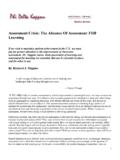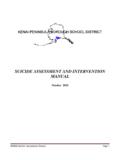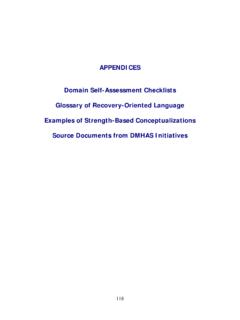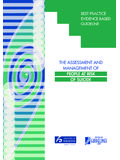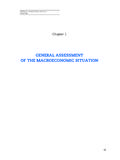Transcription of SAMPLE COMPETENCY-BASED SELF-ASSESSMENT …
1 RESOURCE 14: COMPETENCY-BASED SELF-ASSESSMENT form SAMPLE COMPETENCY-BASED SELF-ASSESSMENT form . (adapted from World Vision's COMPETENCY-BASED SELF-ASSESSMENT form ). Name of Individual Home Base Location Current Position Date of assessment The following assessment tool includes the core humanitarian competencies that staff are expected to demonstrate. The intent is to have a simple yet comprehensive tool to assess core competencies of individuals in humanitarian positions. Upon completion of the assessment , the report provided will highlight the competencies that need to be developed. This will constitute the required information to complete an individual learning and development plan. INSTRUCTIONS. 1. Read the relevant competency description.
2 2. For each indicator provided, select one of the three ratings demonstrating your assessment of your effectiveness in that particular area. Select N/A if the indicator is not applicable or if unsure. 3. You can use the optional text box to provide evidence of how you have demonstrated the relevant competency . 1. UNDERSTANDING OF HUMANITARIAN CONTEXTS AND APPLICATION OF. HUMANITARIAN PRINCIPLES. This competency refers to key issues and practices impacting current and future humanitarian interventions. The humanitarian context Aware/Basic Proficient Advanced N/A. (Knowledge) and and Proficiency utilize in can train practice others Demonstrate understanding of phases of humanitarian response including preparedness and contingency, DRR, response and recovery Apply understanding of the political and cultural context and underlying causes of the humanitarian crisis Demonstrate understanding of the gender and diversity dimensions of humanitarian situations Keep vulnerable people at the centre of the humanitarian response Applying humanitarian standards / principles Aware/Basic Proficient Advanced N/A.
3 (Knowledge) and and Proficiency utilize in can train practice others Ensure that programme goals and activities uphold the principles of the key national and international humanitarian frameworks, codes and commitments under which humanitarian organisations operate Demonstrate understanding of your role and that of your organisation and others within the humanitarian system Integrate beneficiary accountability principles into your approach Demonstrate an understanding of coordination mechanisms Please provide comments that support your ratings for UNDERSTANDING OF HUMANITARIAN. CONTEXTS AND APPLICATION OF HUMANITARIAN PRINCIPLES: 2. ACHIEVING RESULTS EFFECTIVELY. This competency involves behaviours to use resources efficiently and effectively to achieve results, considering the need for speed, scale and quality Programme quality Aware/Basic Proficient Advanced N/A.
4 (Knowledge) and and Proficiency utilize in can train practice others Demonstrate understanding of agency project cycle management Participate in the design and implementation of effective projects and programmes Accountability Aware/Basic Proficient Advanced N/A. (Knowledge) and and Proficiency utilize in can train practice others Collect, analyse and disseminate information to and from communities and other stakeholders Demonstrate accountability to partners and disaster and conflict affected people and communities Decision making Aware/Basic Proficient Advanced N/A. (Knowledge) and and Proficiency utilize in can train practice others Demonstrate flexibility to adapt plans and make decisions in rapidly changing environments Demonstrate understanding of when a decision can be taken and when to involve others Consider the wider impact of the decisions you make in your work to achieve positive results Impact Aware/Basic Proficient Advanced N/A.
5 (Knowledge) and and Proficiency utilize in can train practice others Maintain focus on delivery of timely and appropriate results using available resources Please provide comments that support your ratings for ACHIEVING RESULTS EFFECTIVELY: 3. DEVELOPING AND MAINTAINING COLLABORATIVE RELATIONSHIPS. This competency covers behaviours to develop and maintain collaborative, coordinated relationships at times of heightened complexity and risk Listening & dialogue Aware/Basic Proficient Advanced N/A. (Knowledge) and and Proficiency utilize in can train practice others Actively listen to different perspectives and experiences of stakeholders Establish and maintain clear communication and dialogue with disaster and conflict affected people and other stakeholders Working with others Aware/Basic Proficient Advanced N/A.
6 (Knowledge) and and Proficiency utilize in can train practice others Contribute positively in the team to achieve programme objectives Share appropriate information and knowledge with colleagues and partners as and when appropriate Actively participate in networks to access and contribute to good practice Challenge decisions and behaviour which breach the ICRC/NGO and individual agency Codes of Conduct Please provide comments that support your ratings for DEVELOPING AND MAINTAINING. COLLABORATIVE RELATIONSHIPS: 4. OPERATING SAFELY AND SECURELY IN A HUMANITARIAN RESPONSE. This competency is about demonstrating behaviours required to take responsibility to operate safely in a pressured environment. Security context and analysis Aware/Basic Proficient Advanced N/A.
7 (Knowledge) and and Proficiency utilize in can train practice others Identify and communicate risk and threats and minimise these for you and your agency Personal safety & security Aware/Basic Proficient Advanced N/A. (Knowledge) and and Proficiency utilize in can train practice others Build and maintain a reputation in line with humanitarian standards and acceptance for your work Take appropriate, coordinated and consistent action to handle situations of personal risk and situations of risk for others Reduce vulnerability by complying with safety and security protocols set by your organisation and contextualise appropriately to local scenarios Champion the importance of safety and keep the safety of colleagues and team members in mind at all times Minimising risk to communities and partners Aware/Basic Proficient Advanced N/A.
8 (Knowledge) and and Proficiency utilize in can train practice others Take measures to do no harm and to minimise risks for your partners and the communities you work with Please provide comments that support your ratings for OPERATING SAFELY AND SECURELY IN A. HUMANITARIAN RESPONSE: 5. MANAGING YOURSELF IN A PRESSURED AND CHANGING ENVIRONMENT. This competency refers to essential personal behaviours required to operate effectively within a humanitarian context. Resilience Aware/Basic Proficient Advanced N/A. (Knowledge) and and Proficiency utilize in can train practice others Recognise stress and take steps to reduce it Remain constructive and positive under stress to be able to tolerate difficult and sometimes threatening environments Remain focused on your objectives and goal in a rapidly changing environment Able to adapt to changing situations Keep yourself emotionally stable when helping others Maintaining professionalism Aware/Basic Proficient Advanced N/A.
9 (Knowledge) and and Proficiency utilize in can train practice others Take responsibility for your own work and for the impact of your actions Plan, prioritise and perform tasks well under pressure Maintain ethical and professional behaviour in accordance with relevant codes of conduct Demonstrate personal integrity by using one's position responsibly and fairly Please provide comments that support your ratings for MANAGING YOURSELF IN A PRESSURED AND. CHANGING ENVIRONMENT: 6. LEADERSHIP IN HUMANITARIAN RESPONSE. This competency is about seeing the overall goal within the changing context and taking responsibility to motivate others to work towards it, independent of one's role, function or seniority. self -awareness Aware/Basic Proficient Advanced N/A.
10 (Knowledge) and and Proficiency utilize in can train practice others Show awareness of your own strengths and limitations and their impact on others Demonstrate understanding of your skills and how they complement those of others to support team effectiveness Seek and reflect on feedback to improve your performance Motivating and influencing others Aware/Basic Proficient Advanced N/A. (Knowledge) and and Proficiency utilize in can train practice others Communicate humanitarian values and motivate others towards them Inspire confidence in others Speak out clearly for organisational beliefs and values Demonstrate active listening to encourage team collaboration Influence others positively to achieve programme goals Critical judgement Aware/Basic Proficient Advanced N/A.
